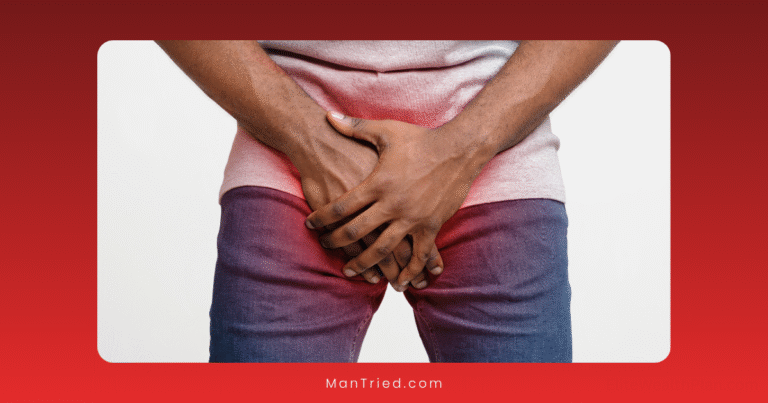Beyond the Pill: Understanding the Root Causes of Erectile Dysfunction

In a world where the little blue pill has become synonymous with treating erectile dysfunction (ED), we’ve fallen into a pattern of addressing symptoms rather than causes. While medications like Viagra and Cialis have helped millions of men regain sexual function, they represent just a small part of a much larger conversation about men’s sexual health.
“Treating erectile dysfunction without addressing its root causes is like putting a Band-Aid on a broken arm,” explains Dr. James Harrison, a urologist specializing in men’s sexual health. “It might provide temporary relief, but it doesn’t solve the underlying problem.”
The Multifaceted Nature of Erectile Dysfunction
Erectile dysfunction affects over 50% of men between ages 40-70, according to research from Wellness OBGYN. Yet many don’t realize that ED is rarely just a standalone condition—it’s often a symptom of something deeper happening in the body or mind.
The Vascular Connection
At its core, achieving an erection is a vascular event. Blood must flow into the penis and remain there long enough for sexual activity. Any condition that impairs blood flow can contribute to ED:
- Cardiovascular disease: Often, ED is the first sign of heart disease, appearing 3-5 years before cardiac symptoms
- Atherosclerosis: Plaque buildup in arteries restricts blood flow throughout the body, including to the penis
- Hypertension: High blood pressure damages blood vessels and reduces blood flow
- Diabetes: Causes nerve damage and vascular issues that significantly impact erectile function
“Poor blood flow is the most common physiological cause of ED,” notes Dr. Sarah Chen, vascular specialist. “What many men don’t realize is that the same factors damaging blood vessels in their penis are likely affecting vessels throughout their body.”
The Hormonal Factor
Hormones play a crucial role in sexual function, with testosterone being the primary male sex hormone:
- Low testosterone: Affects approximately 10-15% of men with ED
- Thyroid imbalances: Both hypothyroidism and hyperthyroidism can impact sexual function
- Elevated prolactin: Can suppress testosterone production
- Cortisol imbalance: Chronic stress elevates cortisol, which can inhibit sexual function
A comprehensive approach to ED should include hormone testing, particularly for men who experience additional symptoms like fatigue, reduced muscle mass, or increased body fat.
The Neurological Component
The nervous system plays an essential role in erectile function, with signals traveling from the brain to the penis:
- Spinal cord injuries: Can disrupt nerve pathways necessary for erection
- Multiple sclerosis: Damages nerve fibers that control sexual response
- Parkinson’s disease: Affects dopamine production, which plays a role in sexual function
- Diabetic neuropathy: Damages nerves throughout the body, including those controlling erection
The Psychological Dimension
The mind-body connection in sexual function cannot be overstated. According to North American Dallas, psychological factors play a significant role in many ED cases:
- Performance anxiety: Creates a cycle of worry and failure
- Depression: Reduces interest in sex and impairs physical response
- Stress: Elevates cortisol and adrenaline, which inhibit erection
- Relationship issues: Unresolved conflicts can manifest physically
- Trauma: Past sexual trauma can impact current sexual function
“The brain is actually our largest sexual organ,” explains Dr. Michael Torres, sex therapist. “Cognitive Behavioral Therapy (CBT) has been shown to be remarkably effective in addressing negative thought patterns that contribute to ED, sometimes matching or exceeding the effectiveness of medication alone.”
Beyond Conventional Treatments
While PDE5 inhibitors like sildenafil (Viagra) and tadalafil (Cialis) remain the most common first-line treatments for ED, they come with limitations:
- They only temporarily increase blood flow without addressing underlying issues
- Side effects can include headaches, flushing, and digestive problems
- Some men experience reduced efficacy over time
- They’re contraindicated for men taking certain medications
Fortunately, research in 2025 has expanded our understanding of alternative approaches that address root causes rather than just symptoms.
Regenerative Medicine
Emerging treatments focus on repairing damaged tissue and improving function at the cellular level:
- Low-Intensity Extracorporeal Shockwave Therapy (Li-ESWT): This non-invasive treatment uses sound waves to stimulate angiogenesis (the formation of new blood vessels) and has shown significant improvement in erectile function. According to a study published in PMC, Li-ESWT is considered a potential cure for ED rather than just a symptom management approach.
- Platelet-Rich Plasma (PRP) Therapy: By injecting concentrated platelets from the patient’s own blood into penile tissue, PRP therapy promotes repair and regeneration. Recent studies show promising results for men who haven’t responded well to conventional treatments.
- Stem Cell Therapy: Research continues to advance in using stem cells to repair damaged erectile tissue. The latest approaches use stem cell-derived exosomes to promote angiogenesis and nerve repair in damaged penile tissue.
Holistic Lifestyle Approaches
Some of the most effective treatments for ED don’t require a prescription:
- Exercise: The Massachusetts Male Aging Study found that previously sedentary men who began exercising in midlife reduced their ED risk by 70%. Regular physical activity improves cardiovascular health, increases testosterone, and reduces stress.
- Nutrition: A Mediterranean diet rich in fruits, vegetables, whole grains, fish, and olive oil supports healthy blood flow. Specific foods like watermelon (rich in citrulline) and dark chocolate (contains flavonoids) may have additional benefits for erectile function.
- Weight management: Even a modest weight loss of 5-10% can improve erectile function in overweight men.
- Sleep optimization: Poor sleep affects hormone production and increases stress hormones that can impair sexual function.
- Stress reduction: Practices like mindfulness meditation, yoga, and deep breathing exercises can lower cortisol levels and improve sexual response.
Traditional and Complementary Medicine
Traditional healing systems offer additional perspectives on treating ED:
- Traditional Chinese Medicine (TCM): Rather than focusing solely on the symptom of ED, TCM aims to restore overall bodily regulation and invigorate “qi” (energy) in vital organs, particularly the liver and kidneys.
- Herbal supplements: Several herbs have shown promise in improving erectile function:
- Ginseng: One of the most researched supplements for men’s sexual health
- Horny Goat Weed: Contains icariin, which has a similar mechanism to PDE5 inhibitors
- Yohimbine: Derived from the bark of the African yohimbe tree, with clinical evidence supporting its use
Integrative Approaches: Combining Therapies for Better Results
The most effective treatment plans often combine multiple approaches. Dr. Emin Ozbek, a leading urologist, advocates for comprehensive treatment protocols that address ED’s multifactorial nature:
“The REGENmax protocol combines acoustic wave therapy, laser therapy, tissue regenerative fluid injections, and hormone optimization to address multiple root causes simultaneously,” explains Dr. Ozbek. “We’re seeing success rates of over 85% in men who previously failed to respond to conventional treatments.”
The Future of ED Treatment
The next decade promises even more innovative approaches to treating ED at its source:
- Gene therapy: Targeting genes like eNOS and VEGF to restore erectile function at the genetic level
- Neurostimulation: Using electrical stimulation to enhance nerve function in the penis
- Artificial intelligence: Creating personalized treatment protocols based on individual risk factors and biomarkers
- Tissue engineering: Developing lab-grown erectile tissue for replacement therapy
Taking the First Step
If you’re experiencing erectile dysfunction, consider these steps toward a more comprehensive approach:
- Get a thorough medical evaluation: ED can be an early warning sign of serious conditions like heart disease or diabetes
- Have hormone levels checked: Particularly testosterone, thyroid, and prolactin
- Assess your lifestyle: Diet, exercise, sleep, stress, and substance use all impact erectile function
- Consider psychological factors: Anxiety, depression, and relationship issues deserve attention
- Explore multiple treatment options: Don’t stop at medication if it doesn’t fully resolve the issue
“The goal isn’t just to enable sexual activity,” says Dr. Harrison. “It’s to restore overall sexual health and wellbeing. When we address the root causes of erectile dysfunction, we often see improvements in many aspects of a man’s health, from cardiovascular function to mental health.”
By looking beyond the pill and addressing the underlying causes of erectile dysfunction, men can achieve not just better erections, but better overall health and quality of life.
Have you tried alternative approaches to treating erectile dysfunction? Share your experience in the comments below.






